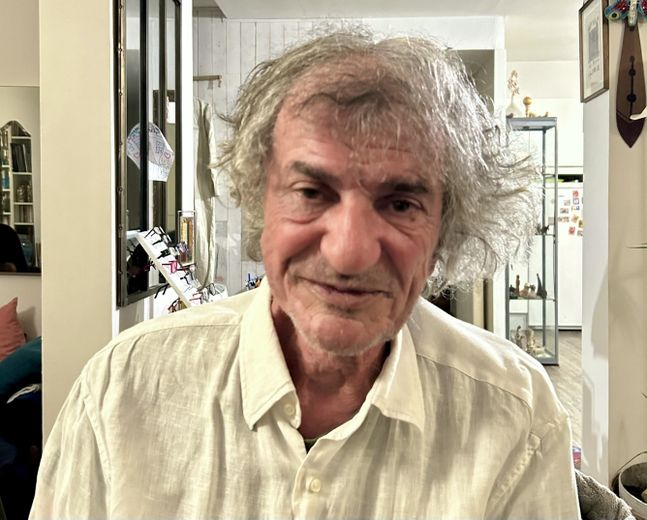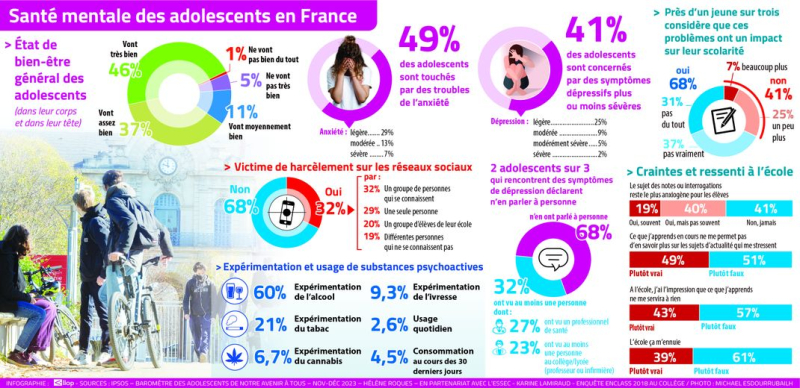“If your teenager has no limits, set yours”: advice from Robert Brès, psychiatrist

En France, 1,4 million de jeunes âgés de 15 à 24 ans ne “font rien”, ce sont les NEET, dit l'Insee : “Not in éducation, employment or training”. UNSPLASH
One in two adolescents is anxious, 40% of 11-15 year olds say that school bores them, 9.1% of high school students have smoked cannabis… what do these figures say about the health of our adolescents ? Psychiatrist Robert Brès deciphers.
Robert Brès, psychiatrist, was responsible for the care unit for older adolescents at the Montpellier University Hospital. He is also co-founder of the Hérault adolescent center and still works in associative structures, such as Aventures nomades.

Robert Brès: "We must welcome adolescents into the world of adults". DR
Anxiety disorders, suicidal thoughts, boredom at school, surveys show that adolescents are not doing well, what is your view on the health of young people ?
I'm having trouble with all this data. I fear that in this way, we will "pin" a teenager to something he was at one time, and we prevent him from being anything other than what he shows us.' ;nbsp;
A depressed teenager could enter this "box" ?
Yes… what interests me a lot is that a teenager is protean, which means that sometimes, to put it another way, he corresponds to a look or an image that we place on him.
The way we look at our teenagers has effects.
Before becoming a psychiatrist, I was a math teacher. I remember class meetings where I did not recognize the students my colleagues were talking about. This is where I spotted the danger of fixing the adolescent forever in what he was at one time.
What are the difficulties encountered by today's adolescents ?
We must be able to distinguish between the disorders which are caused by adolescence itself, and other disorders. We cannot blame adolescents for expressing things they cannot control. A "scattered" for example, is not necessarily hyperactive, it may simply be a young person on the move. When you see, from the edge of the beach, someone who is drowning and floundering in the water, they do not come to you; mind that it must be calmed…
"There are more and more teenagers who don't want to take the slightest risk"
You cite two extremes of a rather problematic adolescence, on the other hand, the "ocnophiles", apathetic to sum up, and the "philobates", very excited ?
It's not just teenagers… Many adults are also philobates, "thrill-seekers"… It's interesting because they are kids who are full of life, curiosity, who search but they end up putting themselves in great danger.
And then there are more and more teenagers, like more and more adults, who don't want to take the slightest risk. They stay at home, sometimes not even taking the risk of speaking. Because it means taking the risk of making a mistake, of talking about oneself, of being heard, of a misunderstanding… They remain frozen. I find that they are the ones in the most danger.

Well-being, school, product consumption… how teenagers are doing.
You echo these 1.4 million young French people, aged 15 to 24, who "do nothing", neither study nor training, nor work, NEET, says INSEE ?
Yes, to put it another way, it is these young people who are “freeze frame”. The Japanese were the first to sound the alarm. And the current paradox is that you can be in contact with the whole world while remaining in your room.
What is the solution ?
To communicate, you have to speak: you convey a message, an emotion, you act… But adolescents do not necessarily have the ability to speak as easily as ;#39;an adult.
And the relationship to language is not the same. For the adolescent, the word has only one meaning. The adult interprets, and this is what the teenager calls the “headache”. This is why it is sometimes complicated to take them to the psychologist: because he will hear things that the teenager no longer controls, does not want to say.
We must allow the adolescent to use a mode of communication that suits him, without forgetting that our job is to get him into speech to hear what is being said. ;he expresses.
"Adolescence, it starts at puberty"
You say that in "the great country of puberty", we need "initiative unions". Are there enough psychologists, teen centers… today ?
We are in a society where we are going to have to increase the number of these "initiative unions". But if we have to do that, it's because the previous system no longer works. And this is the word of parents and older people. Not so long ago, the path was marked. Today, this is not the case at all. The teenager does not know how long adolescence will last, he does not really know where he is going, nor what awaits him, he is often unable to imagine what he wants to do later, and it will perhaps be a profession that does not yet exist. How to help him ?
Indeed, there are quite a few teenagers who feel confused, in the first sense of the term. They have lost their compass. So indeed, we have listening points, “houses"… these are tools that will allow him to tinker when necessary.
And it's adapted to current issues ?
I think so. But it's up to the teenager to make use of it adapted to their project.
To the parents who say they are "overwhelmed", you say to lay down their own edges, that's the only thing they can do. we can do ?
I say it to parents, but also to educators, when people talk to me about kids who have no limits: what limits do you want to set for a teenager ? Start by setting your own limits!
Are we a teenager earlier today, and until later ? What do you think? -you?
This is a complicated question. Adolescence is very difficult to understand, that’s why it’s hard to talk about it.
I am one of those who say that adolescence begins at puberty. Before, it's "Canada Dry" adolescence, it looks like adolescence but it's not. So, we are teenagers, around 10-11 years old. Then, there is the second stage of adolescence where the teenager is summoned to become an adult, after having been summoned to no longer be a child. It's around the age of 15 in our society, when there is the transition between middle school and high school.
And then there is the end of adolescence. It's the entrance to adulthood, but on condition that the adult world welcomes them, and I have the impression that' we don't want to welcome some of them. Theoretically, it's around 18 years old. More and more teenagers are having trouble getting out of their adolescence and find themselves exhibiting teenage behavior at 25 or 30 years old… Besides, there are an interesting indicator is the age at which girls have their first child, it's getting later and later.
And the boys?
It's more complicated, because the men lose the place they had. They have difficulty finding their place, but generally, they find it.
I subscribe to read more




